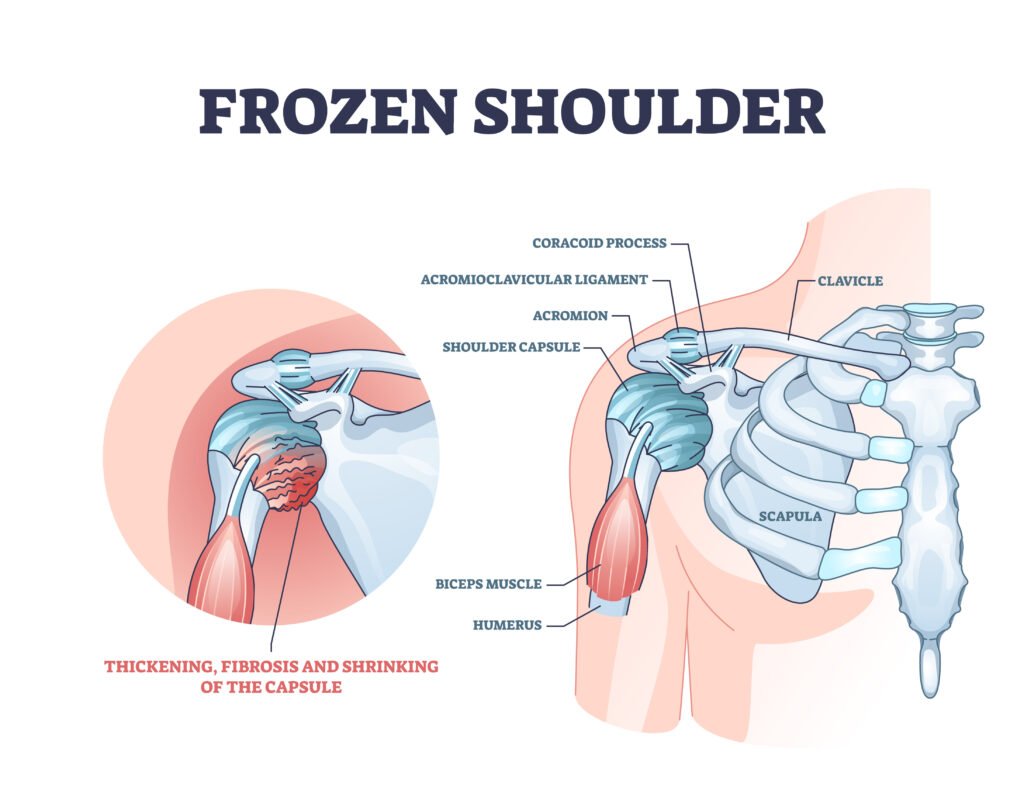Mitigate Pain Clinic – Dr Jeshnu Tople – Pain Management Specialist In Nagpur
Meet Our Doctor

INTERVENTIONAL PAIN AND SPINE SPECIALIST
Dr. Jeshnu Tople
MBBS, DA, DNB, FIAPM, FIPM, FIPP (USA), EDPM (Belgium)
- MBBS from Wardha, Maharashtra
- Diploma in Anaesthesiology from Wardha, Maharashtra
- DNB (Anaesthesiology) from New Delhi
- Fellowship in Pain Management (affiliated to Aesculap Academy, Germany)
- Fellowship of Indian Academy of Pain Medicine from Daradia Pain Hospital, Kolkata
Our Testimonials


Ishan Gadekar

Srujan Topale

Frozen Shoulder In Nagpur
Frozen Shoulder Treatment in Nagpur:
Frozen shoulder, also known as adhesive capsulitis, is a condition that causes pain and stiffness in the shoulder joint, significantly limiting movement. It typically develops gradually, with symptoms worsening over time, making everyday activities like reaching, lifting, or even sleeping difficult. For residents of Nagpur, there are several effective treatment options available to manage frozen shoulder and restore normal function to the shoulder joint.
What is Frozen Shoulder?
Frozen shoulder occurs when the connective tissue surrounding the shoulder joint becomes inflamed, thickens, and tightens, restricting movement. While the exact cause isn’t always clear, frozen shoulder is more common in people over the age of 40, particularly women. It may develop after an injury, surgery, or prolonged immobility, though it can also occur without a clear cause.
Common Causes of Frozen Shoulder
- Injury or Surgery: Any injury or surgery that leads to prolonged immobilization of the shoulder can trigger frozen shoulder.
- Chronic Conditions: Diabetes, heart disease, and thyroid problems increase the risk of developing frozen shoulder.
- Aging and Gender: People over 40, especially women, are more likely to develop the condition.
Symptoms of Frozen Shoulder
Frozen shoulder progresses through three stages:
- Freezing Stage: Pain gradually increases, especially at night, and the range of motion becomes limited.
- Frozen Stage: Pain may lessen, but the shoulder becomes very stiff, and movement is severely restricted.
- Thawing Stage: Gradual improvement in shoulder movement occurs, but full recovery can take months or even years.
Effective Frozen Shoulder Treatments in Nagpur
Physical Therapy
One of the most effective ways to treat frozen shoulder is through physical therapy. Specialized exercises and stretching techniques help restore the shoulder’s mobility and strength. Nagpur’s physiotherapy clinics offer personalized programs tailored to individual needs, aiding in reducing stiffness and improving movement.Non-Steroidal Anti-Inflammatory Drugs (NSAIDs)
Over-the-counter pain relievers such as ibuprofen or naproxen can help reduce pain and inflammation associated with frozen shoulder. For more severe cases, a doctor may prescribe stronger medications.Corticosteroid Injections
Injections of corticosteroids directly into the shoulder joint can provide significant pain relief and reduce inflammation, helping improve the range of motion. These injections are often used when physical therapy and medications aren’t sufficient.Hydrodilatation
Hydrodilatation is a procedure where a sterile fluid is injected into the shoulder joint to stretch the capsule and improve range of motion. This treatment is often effective for patients who have not responded well to physical therapy alone.Platelet-Rich Plasma (PRP) Therapy
PRP therapy involves injecting a concentrated solution of your own platelets into the shoulder joint to promote healing and reduce inflammation. This therapy can accelerate recovery in cases of frozen shoulder, especially when other treatments have not been effective.Shoulder Manipulation
In some cases, doctors in Nagpur may recommend shoulder manipulation under anesthesia. This involves the doctor gently moving the shoulder joint to break up adhesions and improve mobility. This procedure is typically used for severe cases of frozen shoulder.Surgery
Surgery is generally a last resort for frozen shoulder and is only considered when conservative treatments fail. Arthroscopic surgery may be performed to remove scar tissue and adhesions within the joint, helping restore movement.
Benefits of Seeking Frozen Shoulder Treatment in Nagpur
Nagpur is home to experienced orthopedic specialists, physiotherapists, and pain management experts who offer tailored treatment plans for frozen shoulder. Whether you opt for physical therapy, injections, or minimally invasive procedures, the healthcare providers in Nagpur are dedicated to helping you regain your shoulder function and reduce pain. Visit Our Hospital.
Tips for Managing Frozen Shoulder at Home
- Rest the Shoulder: Avoid activities that strain the shoulder joint, but continue gentle movements to prevent stiffness.
- Heat and Ice Therapy: Applying heat can help relax tight muscles, while ice packs can reduce inflammation and numb pain.
- Gentle Stretches: Once the pain subsides, gentle stretches and exercises can help improve the range of motion.
- Posture Correction: Maintaining proper posture, especially when sitting or standing for long periods, can reduce strain on the shoulder.
Conclusion
Frozen shoulder can be a frustrating and painful condition, but with the right treatment, relief is possible. Residents of Nagpur have access to a variety of effective options, from physical therapy and medications to advanced treatments like PRP therapy and hydrodilatation. By seeking timely medical attention, you can significantly reduce symptoms and regain full mobility in your shoulder joint.

FAQ's For Frozen Shoulder In Nagpur
Frozen shoulder, also known as adhesive capsulitis, is a condition characterized by pain and stiffness in the shoulder joint, which can significantly limit movement. It typically progresses in three stages: freezing, frozen, and thawing.
The exact cause of frozen shoulder is not always clear, but it can develop after shoulder injury, surgery, or prolonged immobility. It’s also more common in people with diabetes, thyroid issues, and other chronic conditions.
Symptoms of frozen shoulder include pain (especially at night), a limited range of motion, stiffness, and difficulty performing everyday activities that require shoulder movement. The pain usually worsens during the freezing stage.
The recovery time for frozen shoulder can vary, but it typically takes between 12-24 months for full recovery. However, with proper treatment, symptoms can improve gradually over several months.
Treatments include physical therapy, anti-inflammatory medications, corticosteroid injections, hydrodilatation, platelet-rich plasma (PRP) therapy, and in some cases, surgical intervention (arthroscopy or shoulder manipulation).
Yes, physical therapy is one of the most effective treatments for frozen shoulder. Specific exercises and stretches help improve the shoulder’s range of motion and strength, reducing pain and stiffness.
Yes, corticosteroid injections are often used to reduce inflammation and pain in the shoulder, providing temporary relief. These injections can help improve the range of motion and facilitate physical therapy.
Hydrodilatation is a procedure in which a sterile fluid is injected into the shoulder joint to stretch the capsule and improve range of motion. This can be an effective treatment for frozen shoulder, especially when other methods haven’t worked.
Platelet-rich plasma (PRP) therapy involves injecting a concentrated solution of your own blood platelets into the shoulder joint. This therapy promotes healing and reduces inflammation, helping to alleviate symptoms of frozen shoulder.
Surgery is typically considered a last resort for severe cases of frozen shoulder that do not respond to conservative treatments. Arthroscopic surgery or shoulder manipulation can help break up adhesions and restore mobility.
Our Treatments
- Joint Pain
- Back Pain
- Sciatica Pain
- Neck Pain
- Hand Pain
- Shoulder Pain
- Foot & Ankle Pain
- Limb Pain
- CRPS Pain
- Cancer Pain
- Headache
- Hyperhidrosis
- Herpes Zoster Pain
- Chronic Pelvic Pain
- Scar Tenderness
- Postherpetic Neuralgia
- Trigeminal Neuralgia
- Peripheral Neuralgia
- Chronic Vascular Pain
- Generalised Body Pain
- Chronic Injury Pain
- Failed Back Surgery Syndrome
- Chronic Post Surgical Pain
- Other Painful Conditions
- Slipped DISC / PIVD